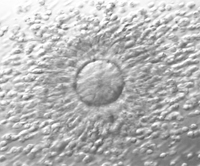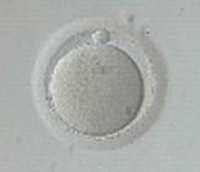Egg donation
 Egg donation is a treatment consisting of using eggs from a donor. This treatment is synchronised so that the donor and recipient are medicated simultaneously so they coincide at the time of egg retrieval and embryo transfer. An alternative is to use vitrified donor eggs, which do not require simultaneous treatment.
Egg donation is a treatment consisting of using eggs from a donor. This treatment is synchronised so that the donor and recipient are medicated simultaneously so they coincide at the time of egg retrieval and embryo transfer. An alternative is to use vitrified donor eggs, which do not require simultaneous treatment.
 Treatment protocol for egg recipients
Treatment protocol for egg recipients
The objective of the treatment is purely to prepare the endometrium to be receptive to the arrival of an embryo. It consists of simulating a "standard" female ovarian cycle by administering the hormones that are usually produced in the ovary in a natural cycle.
When is donation advisable?
Egg donation is advisable in women who, for different reasons, do not have their own eggs to be able to conceive. For example:
- Premature ovarian failure
- Absence of ovaries following cancer surgery
- Age. The likelihood of achieving a normal pregnancy beyond 43-44 years of age is very low
- In cases where the woman is a carrier of a transmissible genetic disease
How are egg donors selected?
The requirements to be a donor are:
- To be between 18 and 35 years of age
- No family history of hereditary diseases
- Normal karyotype (chromosome analysis)
- Sexually transmitted diseases study negative for hepatitis B and C, AIDS and syphilis
- Normal gynaecological check up
Anonymous donation: According to Spanish Law on Assisted Reproduction Techniques, the donation of sperm, eggs or embryos should be anonymous.



















